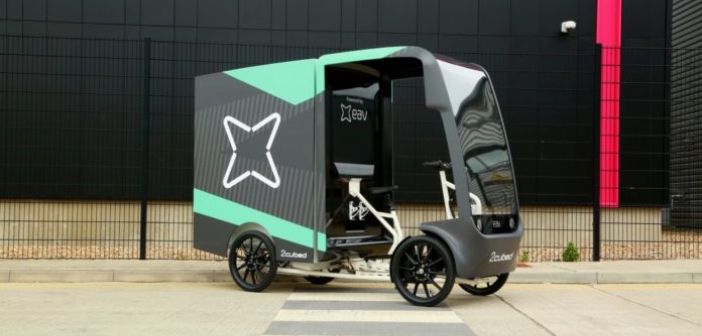Aberdeen City Council has partnered with Oxfordshire-based micromobility manufacturer Electric Assisted Vehicles (EAV) to develop hydrogen-powered lightweight EVs for last-mile deliveries.
As part of the Interreg NWE’s Fuel Cell Cargo Pedelecs Project, the partnership aims to validate the use of hydrogen fuel cells for sustainable last-mile deliveries.
EAV will provide its 2Cubed vehicle platform with its patented ‘Cloudframe’ chassis to trial the fuel cell system, in seven European cities over 12 months.
Adam Barmby, CEO of EAV, said: “The use of hydrogen fuel cells in the last or even mid-mile scenario is a very interesting proposition. Within EAV we observe the development of the rapidly growing electric vehicle market daily.
“Apart from our concerns over the weight of the increasing number of battery-powered vehicles, we keep questioning where all these batteries are going to come from. It’s a known fact that the raw materials for battery production are in short supply, which is why EAV focuses on weight reduction, so we use less energy and therefore require less batteries.
“To take this process even further, we’ve wanted to develop a hydrogen fuel cell option which requires a vehicle to have even less batteries as the electricity comes from the hydrogen reaction which is about as environmentally-friendly as you can get.”
Aberdeen is one of the cities in which 36 vehicles are being deployed to as part of the validation process. Supported by investment from the European Union and the Scottish government, the project will be managed by the German Aerospace Center.
Furthermore, it includes DPD Group, H2Range (an affiliate of DLR), Unicorn Energy, Energy Expo and Brussels University.
Leo Bethell, head of partnerships at EAV, added: “We’re really excited to be working with the City of Aberdeen as a key part of this validation exercise. Every town and city across the globe must now look at significantly reducing emissions and providing a cleaner, safer environment for its inhabitants.
“The Covid pandemic has actually advanced a number of projects to reduce vehicle traffic and reinforce the need for cleaner and safer cities and smaller, lighter urban commercial goods delivery vehicles are vital to that change.
“This is a technically advanced project and it’s coming to a city which has been at the forefront of advanced engineering in Scotland for the last hundred or so years. We’re pleased to be at the cutting edge of hydrogen fuel cell urban vehicle deployment in the UK.”
Read more: EAV launches vehicle to help e-scooter deployment





